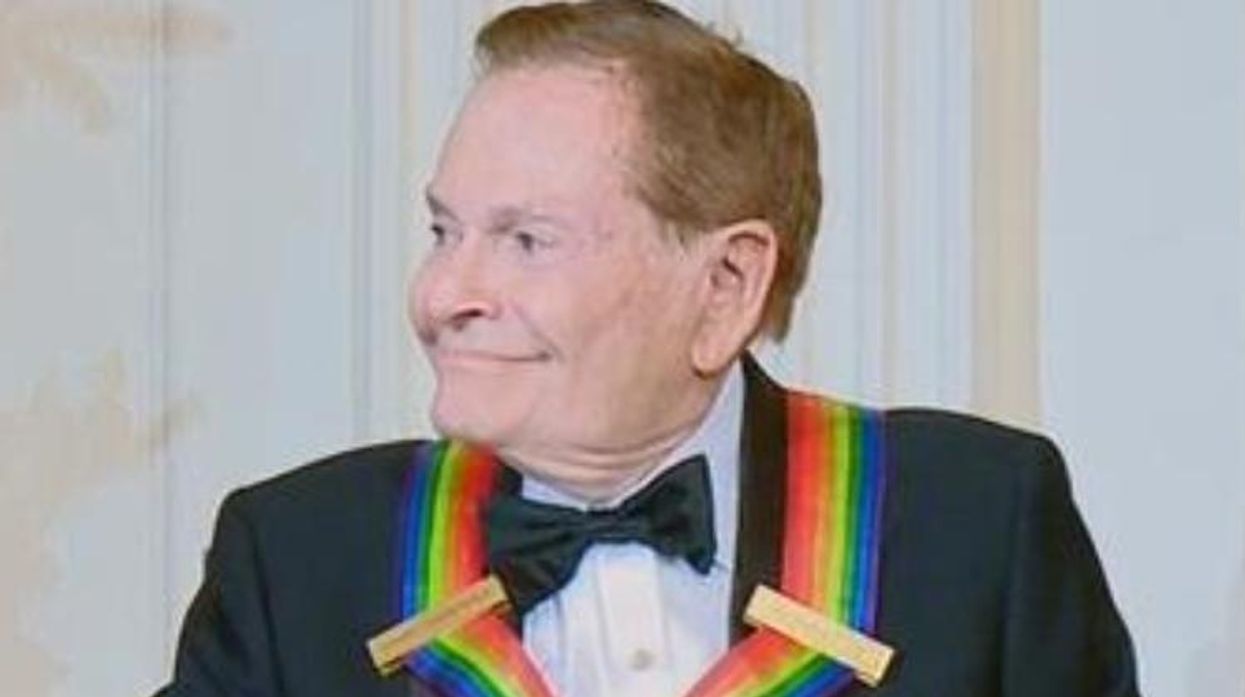Jerry Herman, the award-winning composer-lyricist of Broadway shows including Mame, Hello, Dolly! and La Cage aux Folles, died Thursday at age 88.
Herman, who was gay and also a long-term survivor of HIV, wrote hits such as the Hello, Dolly! title tune, Mame's "We Need a Little Christmas" and "Bosom Buddies," and La Cage's "I Am What I Am," which became an anthem for LGBTQ people. He won Tony Awards for Dolly! and La Cage.
He died at a hospital in Miami of pulmonary complications, the Associated Press reports.
Herman was born in Manhattan in 1931 and grew up in Jersey City, N.J. He learned piano and staged musicals at a summer camp his parents ran in upstate New York, and he caught the theater bug big-time in 1946, when his parents took him to see Annie Get Your Gun on Broadway. The musical starred Ethel Merman and had songs by Irving Berlin.
"I can still remember coming home from the show and sitting down at the piano and being able to play parts of six songs I'd never heard before," Herman once told The New York Times. "I was truly inspired by Irving Berlin, by his simplicity, and by the fact that he was able to write in a vernacular that the entire country could grasp immediately."
After studying theater at the University of Miami, he started writing songs and shows. His first full Broadway score was for 1961's Milk and Honey, about American visitors to Israel, and it was a hit that ran for 543 performances.
He quickly surpassed that, though, with Hello, Dolly! Based on Thornton Wilder's play The Matchmaker (adapted by Michael Stewart) and directed by Gower Champion, it opened in January 1964 and ran for until December 1970. It won several Tonys, including Best Musical, Best Actress in a Musical for star Carol Channing, and Best Score for Herman. It was made into a 1969 film starring Barbra Streisand and was revived on Broadway several times, most recently in 2017-2018 with Bette Midler in the starring role (and, for a time, Bernadette Peters).
He had another hit in Mame, which opened in 1966 and ran three and a half years. Based on Patrick Dennis's novel Auntie Mame, about an eccentric woman guiding her nephew through life, it starred Angela Lansbury. Herman's score was Tony-nominated but lost to Mitch Leigh and Joe Darion's songs for Man of La Mancha.
Herman then went through a period of flops, but he came back strongly in 1983 with La Cage, a musical adaptation of a French play and film about a gay couple who run a drag club. One of the men poses as a woman when their son becomes engaged to the daughter of a conservative couple. Harvey Fierstein wrote the book for the show and Arthur Laurents directed it, and it was a solid success, running for four years and bringing Tonys to Herman, Fierstein, Laurents, actor George Hearn, costume designer Theoni V. Aldredge, and the show itself.
"That was a glorious experience," Laurents told Larry Kramer in an Advocate interview in 1995. "We all got on marvelously. At the end of every performance, straight people would get up applauding two men dancing off into together into the sunset. I thought that was an accomplishment."
"Critics -- gay and straight -- called the show far too cautious, especially at a time when AIDS was becoming a full-blown crisis in America and homophobia was widespread," The New York Times noted in its obit of Herman. "But Mr. Herman insisted that the musical stage was not a soapbox, and said of the gay community, 'One day when they are old and gray they will realize what this show is doing for their cause and send a thank-you note.'" It actually didn't take that long, as the community soon embraced the show and adopted one of the songs, "I Am What I Am," as an anthem of pride.
Herman was in a relationship with designer Martin Finkelstein in the 1980s; Finkelstein died of AIDS complications in 1989. Herman was diagnosed with HIV in 1985, but medications kept the virus under control. He eventually married real estate broker Terry Marler, who survives him, along with goddaughter Jane Dorian.
In addition to his competitive Tony Awards, Herman's accolades included a Lifetime Achievement Tony and the Kennedy Center Honors. And upon his death, tributes poured in on social media.




































































Charlie Kirk DID say stoning gay people was the 'perfect law' — and these other heinous quotes